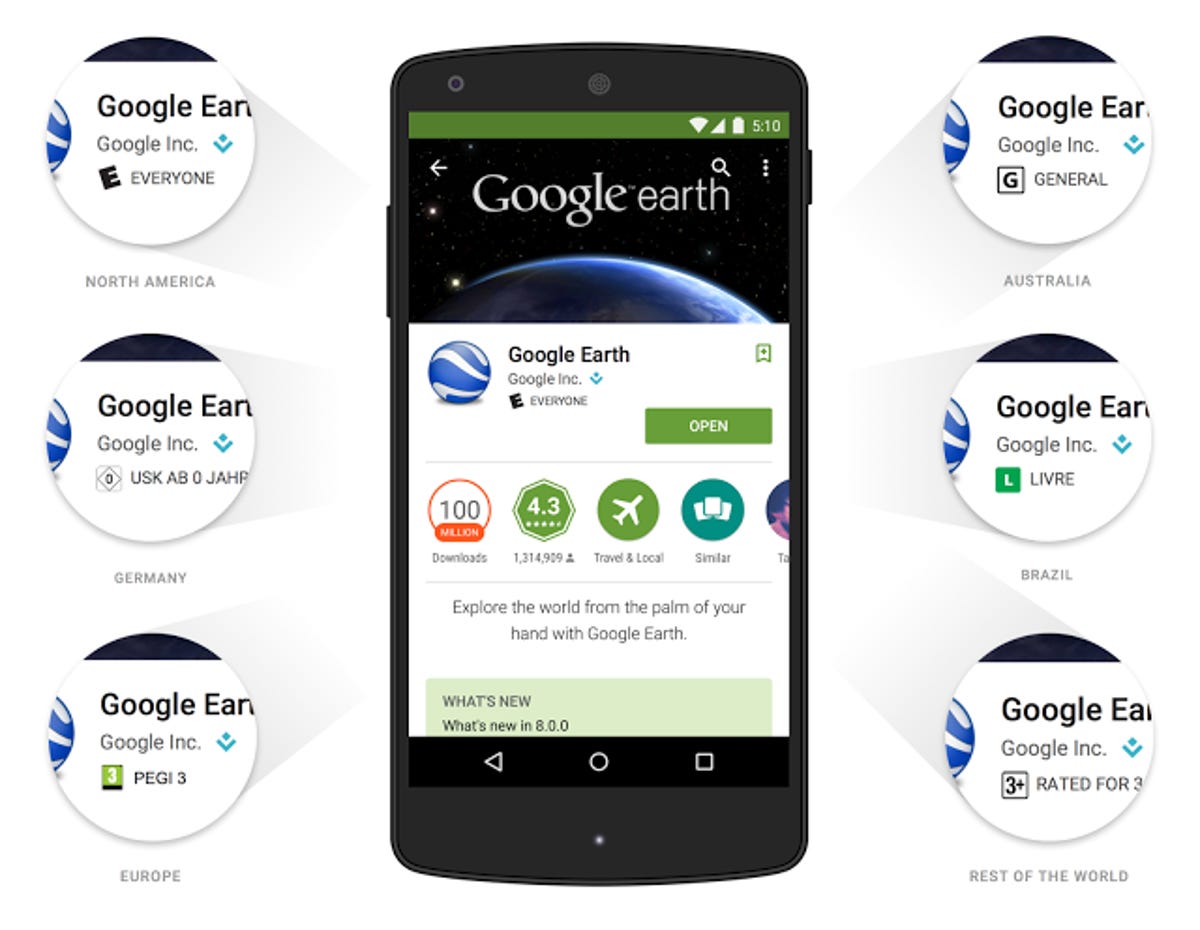
All Google Play apps will soon come with age-based content ratings and face the scrutiny of Google reviewers before entering the store.
Google has introduced age-based ratings for Android apps and games, the company said Tuesday in a blog post. Rather than develop its own format, however, Google will go with rating systems already in use across the world. In the US, for instance, all apps and games will be rated based on the Entertainment Software Rating Board (ESRB) format employed by the games industry.
In a more dramatic shift, Google also announced that a “team of experts” has, over the last several months, quietly started to evaluate apps before they’re allowed entry into the Google store. If the apps don’t violate developer policies, Google said, they will be added to Google Play “within a matter of hours.” The developer policies exclude sexually explicit material, “gratuitous violence,” hate speech, gambling, “dangerous products,” spam and infringement of intellectual property.
The moves announced Tuesday give Google more control over what makes it into the store and gives users — especially parents — greater insight into an app’s content to help determine whether it’s suitable for children.
For years, Google allowed apps into its store without any human oversight. The policy has faced criticism, with some saying it allowed anything and everything into the store. For developers, though, it provided quick access to the growing number of Android users.
By contrast, Apple has screened apps since the inception of its App Store in 2008. Many developers have been required to tweak their apps before gaining admission, and the process can take weeks, if not months, which has raised the ire of developers. Apple has made strides in getting apps into the App Store more quickly but still reviews every app before allowing it into the App Store.
For its part, Google says that developers will see little to no delay compared with the previous model. The company has also updated its publishing status page to help developers understand why their apps may be delayed or banned.
“Developers now have more insight into why apps are rejected or suspended, and they can easily fix and resubmit their apps for minor policy violations,” the company wrote in the blog post.
Meanwhile, Google’s decision to add age-based content ratings to apps in its Google Play store likewise represents a marked change for the company. Google Play, which offers 1.4 million apps, has long had user reviews and a very general content rating, ranging from “everyone” to “high maturity.” Until now, though, Google did not feature age-based ratings and chose not to rely on third parties to determine them.
Over on the iOS side, Apple offers its own ratings based on content and age. The company’s 4+ rating, its lowest, means an app’s content contains “no objectionable material” and is suitable for anyone four years of age and older. The topped-out rating of 17+ means a person must be at least that age to access content that is considered adults-only.
Neither Google Play nor Apple’s App Store allows apps dedicated solely to pornography, though App Store apps with a 17+ rating or Google Play apps with a “high maturity” rating can contain sexual or violent content.
To help regulate apps, Google has placed a new rating questionnaire on its developers page. Current and future developers will need to complete the questionnaire for each of their apps. After they do so, a content rating will be generated. In the US, the ratings will be based on standards set in place by the ESRB. Google has also partnered with the International Age Rating Coalition, the Pan-European Game Information and the Australian Classification Board, among other rating systems, to provide relevant ratings in other countries. Where official scales are not available, Google will provide a generic age-based rating.
Google is giving developers the next six weeks to get their apps rated. Until developers fill out the paperwork, their apps will be listed as “unrated.” Starting in May, all apps will be required to carry a rating in order to be accessible in Google Play.
Google did not respond to a request for comment.



